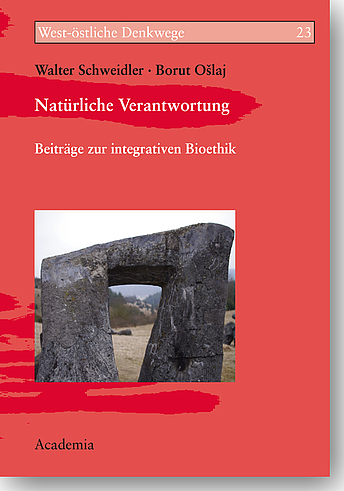Schweidler | Oslaj
Natürliche Verantwortung
ISBN 978-3-89665-629-2
englischThe 'Natural' is not founded on any code, program, system or design from which the uniqueness and the strivings of those beings who belong to it can be deduced and explained. Nature is no artifact; rather it is the opposite of all that is artificial. The Natural reveals itself in the network of differences that exist between natural species and the beings that compose them. The Natural is that which reveals itself from itself and orients itself towards something more than it is.
As such, and owing to our ability to understand and to a certain extent influence the behavior of all natural beings, nature grounds that obligation we all as human beings have toward species and individuals. While we are the only beings who are capable of realizing and making good on this responsibility, we, while vouchsafing the difference that comprises our own species, integrate ourselves with the totality of nature.
This is the departure point of an 'integrative bioethics' that understands itself decisively as philosophy. It stresses not only the critical treatment of social-cultural, political, historico-philosophical and general ethical questions, but is also obliged to consider those thematic corner stones which, on first glance, seem little within, if not entirely without, the providence of bioethics. It is from this vantage point that integrative bioethics can find its rightful place in the opening considerations of systems theory, anthropology, ethics and natural philosophy.
Such an endeavor can be actualized fully only in an interdisciplinary and intercultural context. It is for this reason that the present volume has collected critical contributions that are capable of inspiring this ambition.
Dem 'Natürlichen' liegt kein Code, kein Programm, kein System und kein 'Design' zugrunde, woraus sich die Eigenart und die Strebungen der ihr zugehörigen Wesen erklären und damit ableiten lassen. Die Natur ist kein Artefakt, sondern das Gegenteil alles Künstlichen. Das Natürliche zeigt sich im Geflecht der Differenzen zwischen den natürlichen Arten und den Wesen, die ihnen angehören. Natürlich ist, was sich von sich selbst her zeigt und was von sich selbst aus auf etwas aus ist.
Als solche begründet die Natur die Verantwortung, die wir als Menschen aufgrund unserer Fähigkeit, das Verhalten natürlicher Wesen zu verstehen und in gewissem Maße zu beeinflussen, uns wie ihnen allen gegenüber haben. Indem wir als die einzigen Wesen, die zur Verantwortung fähig sind, diese Verantwortung wahrnehmen und ihr gehorchen, integrieren wir uns, unseren artbildenden Unterschied bewahrend, in das Ganze der Natur.
Dies ist der Ausgangspunkt einer 'Integrativen Bioethik', die sich im dezidierten Sinne als Philosophie versteht. Sie beansprucht nicht nur die kritische Behandlung der soziokulturellen, politischen, geschichtsphilosophischen und allgemein ethischen Fragen, sondern muss auch grundlegende philosophische Ebenen und Themen behandeln, die auf den ersten Blick nur wenig Berührungspunkte mit allgemein bioethischen Problemen aufweisen. Zur integrativen Bioethik gehören somit notwendigerweise auch die grundlegenden systemtheoretischen, anthropologischen, ethischen und naturphilosophischen Überlegungen.
Dieses Programm kann nur im interdisziplinären und interkulturellen Dialog verwirklicht werden. Dazu wollen die in diesem Band versammelten Beiträge einen kritischen Anstoß geben.


